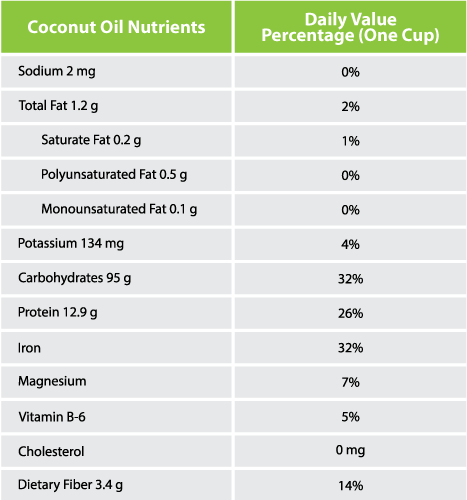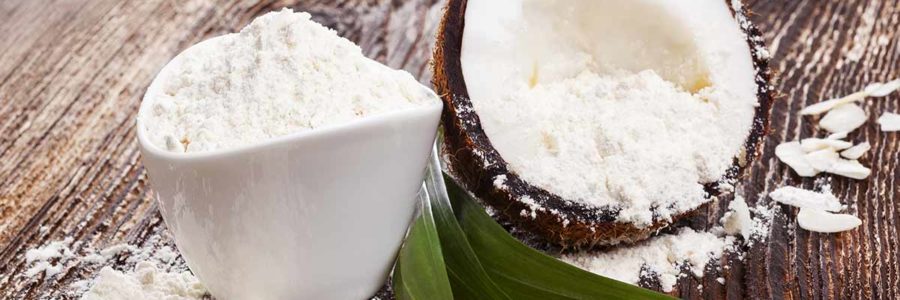Coconut flour is a gluten-free flour produced from coconuts. Read more about coconut flour’s benefits, nutrition information, and the many ways you can use it.
What is Coconut Flour? | Coconut Flour Nutritional Information | Benefits of Coconut Flour | Is Coconut Oil Gluten-Free? | How To Use Coconut Flour | Where To Find Coconut Flour
What is Coconut Flour?
Coconut flour is coconut meat that has been ground and dried. First used in the Philippines, coconut flour was originally a by-product of coconut milk. It has a mild taste and texture similar to other flours, making it a viable substitute.
Coconut Flour Nutritional Information
One cup of coconut flour contains the following nutrients:

Benefits of Coconut Flour
The high nutrient content of coconut oil provides various health benefits as well. Here are a few of the top reasons to add coconut oil to a person’s diet.
It may regulate blood sugar levels. Compared to other flours made from corn and wheat, coconut flour has lower levels of carbs while having higher amounts of fiber, protein, and good fats such as lauric acid. This combination of ingredients can help a person feel fuller for extended periods and decrease overeating. This combo could help reduce insulin spikes and help maintain healthy blood sugar levels. (Elevated levels of insulin can trigger the rapid division of cells. During this time, higher blood sugar and fat levels could be the catalyst for the expansion of tumors). Coconut flour also contains medium-chain triglycerides (MCTs), which help enhance the production of ketones and stabilize blood sugar levels.
It could help decrease harmful cholesterol levels. Coconut flour is high in fiber, which could help improve heart health and lower LDL cholesterol levels. Elevated levels of LDL can increase plaque formation and cling to the insides of arteries, making them hard and narrow. This narrowing can cause the risk of strokes and heart disease to rise over time. A blood cholesterol level of 240 milligrams per deciliter is considered high cholesterol. But that number doesn’t tell the entire story. It’s important to know HDL and LDL levels and other inflammation markers.
Positive impact on metabolism. Coconut flour contains medium-chain fatty acids, which the body converts into energy. These MCFA’s are easily digested and go straight to the liver, positively impacting metabolism and possibly weight loss. Potential signs of metabolism issues include cold hands and feet, frequent headaches, poor digestion, difficulty sleeping, mood swings, blood sugar crashes, and frequent urination.
It may help prevent constipation. Constipation is the infrequent, irregular, or difficulty of moving the bowels. Coconut flour is high in fiber, which can help relieve or prevent constipation. Also, the coconut flower stimulates digestion by acting like a prebiotic. Prebiotics are not digestible and help promote the growth of healthy bacteria in the intestines. Common causes of constipation include physical inactivity, antacids and antidepressants, dietary changes, and lack of fiber and water intake.
It may improve heart health. In addition to constipation, the high fiber in coconut flour may boost heart health by reducing the risk of heart disease. Improved heart health decreases the risk of heart attacks and coronary artery disease.
Is Coconut Flour Gluten-Free?
Coconut flour is ideal for gluten-free diets because it is gluten-free. Many people are allergic to gluten, a protein found in wheat, rye, barley, and other foods. If a person is gluten intolerant, they cannot digest this protein, which can cause diarrhea, abdominal pain, gassiness, and other digestive issues. Some beverages, marinades, soups, dressings, sauces, and a few cosmetics are hidden sources of gluten. Coconut flour may be viable for those with other types of food allergies or celiac disease.
How To Use Coconut Flour
Coconut flour can be used in many ways and added to a variety of dishes:
Cooking with coconut flour. When baking, coconut flour can be combined with self-rising ingredients such as eggs or other flour. The high fiber content in coconut flour causes it to absorb a lot of water, drying out some dishes. As a result, this often calls for changing the amount of liquid the recipe requires when using traditional all-purpose flour.
Coconut flour can also thicken soups and stews. Also, it can serve as a 1:1 replacement for all-purpose flour when breading meat or fish.
Baking with coconut flour. When baking, coconut flour will quickly absorb liquids. A slight change in the recipe may be required: for every two tablespoons of coconut flour added, two tablespoons of water can also be added. Besides adding water, two other methods to retain moisture are often used: one option is to add coconut oil to the recipe. The second alternative is to replace up to 20 percent of the all-purpose flour in the recipe with coconut flour. Due to its high fiber content, some recipes require additional eggs when using coconut flour.
Coconut flour can be used in the following dishes:
- Pizza crust
- Baked goods (cookies, muffins, bread, etc.)
- Soups
- Stews
- Burgers
- Meat
Where to Find Coconut Flour
Coconut flour can be purchased at most grocery stores or purchased online. You can find it in various sizes, such as 16-ounce, 22-ounce, and 44-ounce bags. You can also make your own coconut flour by following these steps:
- Blend coconut meat and water in a blender at high speed
- Use a straining bag to catch coconut meat
- Spread coconut meat onto a baking sheet
- Preheat oven to 150 degrees
- Bake for four to six hours or until a flour-type, powdery texture
Note: The coconut milk obtained when straining the meat can be saved and stored for other uses.
First used in the Philippines, coconut flour has been used in a variety of baked and cooked dishes, including desserts, soups, meats, and pizza crusts. The flour can be combined with all-purpose flour or used as a 1 to 1 replacement. Coconut flour is a viable option for those allergic to wheat and gluten. It’s an excellent alternative for people with Celiac disease. The flour has many nutrients and may help with various conditions, such as constipation, heart disease, blood sugar, and cholesterol.
Coconut flour has many benefits, but it may not be for everyone. For example, individuals allergic to coconuts should refrain from using coconut flour. Symptoms of coconut allergies include wheezing, nausea, vomiting, diarrhea, coughing, runny nose, or swelling of the tongue, face, or lips. Each person must consider their own body and health when deciding to consume coconut flour.
Medical Disclaimer: This article is based on the opinions of The Cell Health team. The information on this website is not intended to replace a one-on-one relationship with a qualified healthcare professional and is not intended as medical advice. It is intended to share knowledge and information from the research and experience of the Cell Health team. We encourage you to make your own healthcare decisions based on your research and in partnership with a qualified healthcare professional.


